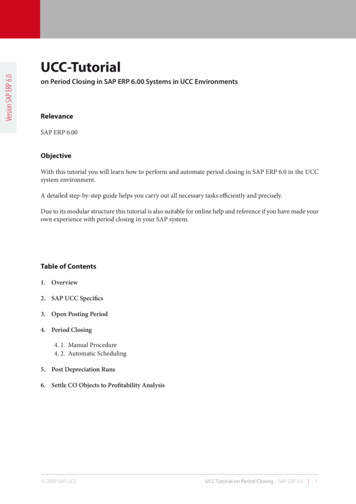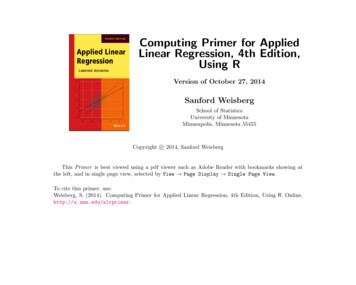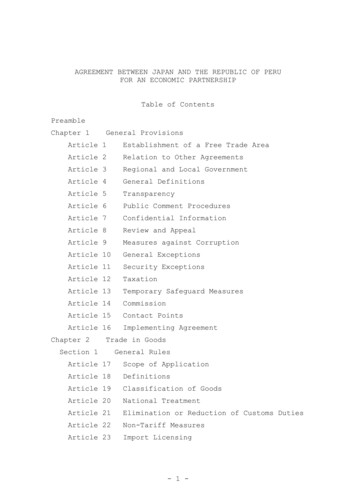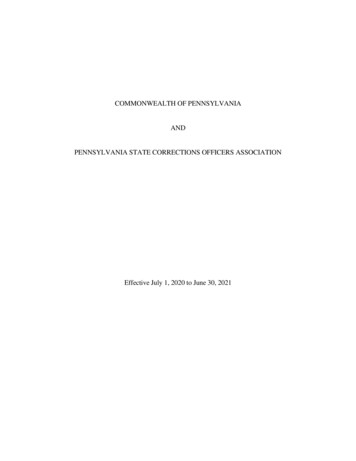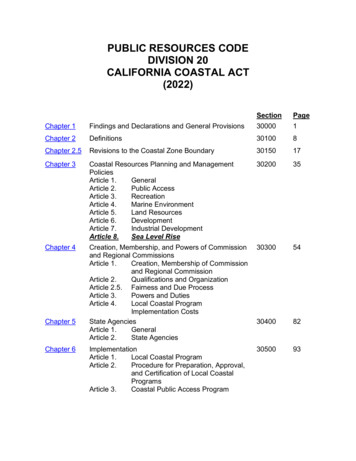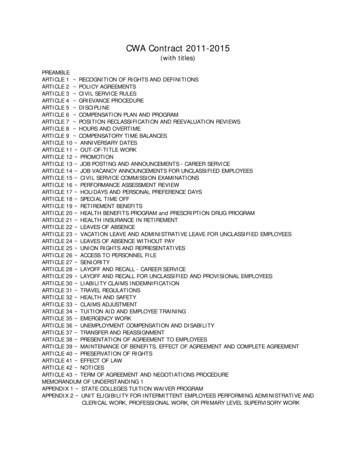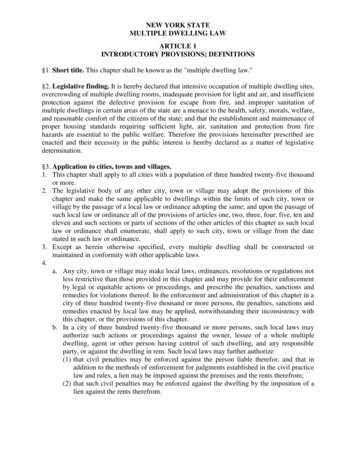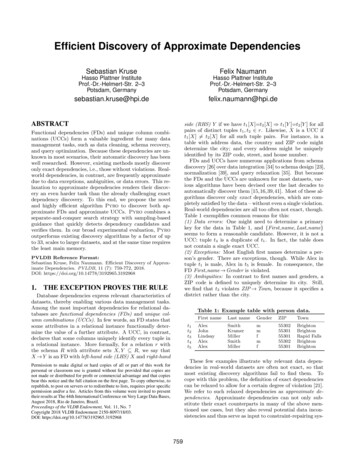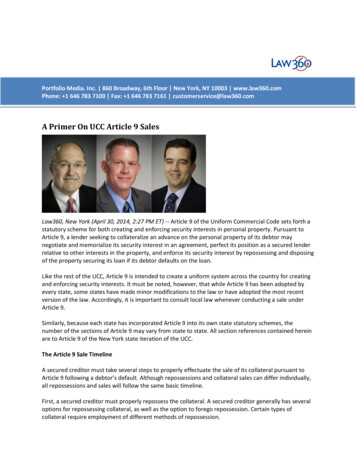
Transcription
Portfolio Media. Inc. 860 Broadway, 6th Floor New York, NY 10003 www.law360.comPhone: 1 646 783 7100 Fax: 1 646 783 7161 customerservice@law360.comA Primer On UCC Article 9 SalesLaw360, New York (April 30, 2014, 2:27 PM ET) -- Article 9 of the Uniform Commercial Code sets forth astatutory scheme for both creating and enforcing security interests in personal property. Pursuant toArticle 9, a lender seeking to collateralize an advance on the personal property of its debtor maynegotiate and memorialize its security interest in an agreement, perfect its position as a secured lenderrelative to other interests in the property, and enforce its security interest by repossessing and disposingof the property securing its loan if its debtor defaults on the loan.Like the rest of the UCC, Article 9 is intended to create a uniform system across the country for creatingand enforcing security interests. It must be noted, however, that while Article 9 has been adopted byevery state, some states have made minor modifications to the law or have adopted the most recentversion of the law. Accordingly, it is important to consult local law whenever conducting a sale underArticle 9.Similarly, because each state has incorporated Article 9 into its own state statutory schemes, thenumber of the sections of Article 9 may vary from state to state. All section references contained hereinare to Article 9 of the New York state iteration of the UCC.The Article 9 Sale TimelineA secured creditor must take several steps to properly effectuate the sale of its collateral pursuant toArticle 9 following a debtor’s default. Although repossessions and collateral sales can differ individually,all repossessions and sales will follow the same basic timeline.First, a secured creditor must properly repossess the collateral. A secured creditor generally has severaloptions for repossessing collateral, as well as the option to forego repossession. Certain types ofcollateral require employment of different methods of repossession.
Second, a secured creditor must give reasonable notice of its intent to sell its collateral to the debtorand other parties with interests in the collateral. What constitutes reasonable notice will vary dependingon the type of collateral and the circumstances surrounding the sale of the collateral.However, a secured creditor will generally be deemed to have given reasonable notice if the securedcreditor gives the debtor and other interested parties notice of the sale at least 10 days before the sale.A secured creditor with a security interest in perishable collateral does not have to give notice of thesale.Third, the sale of collateral by a secured creditor must be “commercially reasonable.” Article 9 does notspecifically define this term but, generally speaking, a secured creditor can protect itself by usingreasonable efforts to maximize the proceeds of a collateral sale.A lender should seek to sell its collateral on the most recognized market for the collateral, in the mannerthat the collateral is normally sold, and should take steps like rehabilitating or maintaining the collateralif these steps will garner a larger profit.Fourth, a secured creditor must properly apply the proceeds of the sale of the collateral. The creditormay first apply the proceeds to any costs and legal fees associated with the sale, and then apply theproceeds to the secured obligation. The creditor must then distribute the proceeds to junior interests inthe collateral and return any excess sale proceeds to the debtor.Repossession of CollateralArticle 9 provides a secured creditor with the advantage of taking possession of its collateralimmediately upon a debtor’s default. It should be noted that certain remedies allowed by Article 9 mustbe provided for in the security agreement between the secured creditor and the debtor but, in general,a secured creditor has the right to repossess collateral unless the parties have expressly agreedotherwise.A secured creditor has three options for repossessing collateral under Article 9. A secured creditor may:(1) exercise its right to self-help repossession; (2) require its debtor to assemble and deliver thecollateral; and (3) resort to a traditional judicial foreclosure. However, a secured creditor must also beaware that certain categories of collateral require certain actions for repossession.Self-Help RepossessionInventory and EquipmentA secured creditor may repossess a piece of collateral or render a piece of equipment unusable on thedebtor’s premises through self-help and without judicial process pursuant to Section 9-609(b)(2) of theUniform Commercial Code. Self-help repossession is the easiest, quickest and most cost-effective meansof repossessing collateral as it does not require the time and expense of obtaining a court order.However, self-help repossession poses risks because the creditor must ensure that there is no breach ofthe peace when self-help is exercised. If the creditor or its agent causes a breach of the peace orotherwise wrongly repossesses the collateral, the creditor may be liable for conversion damages andpossibly punitive damages.
Unfortunately for practitioners, the phrase “breach of the peace” is not specifically defined.Furthermore, the prohibition cannot be waived by agreement between the parties, and the parties maynot determine by agreement what constitutes a “breach of the peace.” Accordingly, the issue of what isdeemed such a “breach of the peace” has been the subject of much litigation and case law is the onlyguidance that secured creditors have.Courts have generally defined “breach of the peace” rather broadly to mean “a disturbance of publicorder by an act of violence, or by any act likely to produce violence, or which by causing consternationand alarm, disturbs the peace and quiet of the community.” People v. Most, 171 N.Y. 423, 64 N.E. 175(1902).Hence, the secured creditor is well-advised to consider discontinuing a self-help repossession attemptupon the least bit of resistance from a debtor or third party, as repossessions over mere oral protestshave been found to breach the peace. Below is a list of actions that have been deemed by courts to havebreached the peace:Breaches of the peace have included:being accompanied by a uniformed police officer without a court order during a repossession;being told to stop by a representative of the debtor;involving a nearby police officer;cutting a chain securing a gate and leaving the debtor’s other property unprotected;breaking a window; andbreaking into a closed garage.Acceptable means of repossession have included:tricking the debtor;entering onto property that is not locked; andtaking a vehicle from an open garage.A secured creditor may also disable a piece of equipment and then dispose of the equipment through asale with the equipment remaining on the debtor’s premises. In fact, a secured creditor may be able topreserve the value of the equipment by disabling the equipment.It is important to note that this remedy is only available to secured creditors that have a security interestin equipment. For example, a secured creditor can disable and dispose of a forklift used in warehouseoperations, on the debtor’s property, but not a forklift held for resale, and thus constituting inventory,of an equipment sales business.AccountsUnder Section 9-607 of the Uniform Commercial Code, when a debtor that pledges its accounts ascollateral defaults, the secured creditor has the right to collect payment directly from those accounts. Asecured creditor that knows the identity of the account debtor may simply provide written,authenticated direction to the account debtor to pay the secured creditor directly.
Once a secured creditor has provided that notice, the secured creditor must be repaid by the accountdebtor. An account debtor that does not repay the secured creditor directly remains liable for its debt tothe secured creditor, even if the account debtor repays the debtor.A secured creditor should be ready to provide proof of the debtor’s assignment, as Section 9-406(c) ofthe Uniform Commercial Code provides that an account debtor may request proof of assignment of itsaccount by the debtor to the secured creditor. The proof of assignment need only be reasonable andcould consist simply of a copy of the security agreement signed by the debtor.Even though accounts are easily convertible to cash and their collection cannot conceivably result in abreach of the peace, a secured creditor does face some risk in sending out notices to account debtors.Most notably, account debtors might not feel obligated to repay the secured creditor.Account debtors often have a valued business relationship with their own creditors. Furthermore,account debtors might worry that the secured creditor will not honor warranties made by the debtor.Therefore, account debtors might withhold payments from the secured creditor to protect itself frombearing the cost of defective goods.Account debtors might also not believe that the secured creditor will pursue payment. A securedcreditor is wise to protect itself by requiring the debtor to maintain accurate records that can be used topursue account debtors that refuse to pay. These records should include purchase orders, invoices andsigned contracts, as well as any other records that the debtor might keep in order to prove the accountdebtor’s obligation.Alternatively, a secured creditor can choose to refrain from pursuing self-help repossession of accountsby permitting account debtors to continue paying the debtor and by then requiring the debtor to remitthe funds to the creditor. In this situation, however, the secured creditor runs the risk of the debtormisappropriating account proceeds to fund its operations.A lockbox arrangement is advisable when dealing with accounts. A lockbox agreement generallyprovides that the account debtor will make payments to a location only accessible by the secured party.Pursuant to the lockbox arrangement, the secured creditor first pays itself and then remits the surplusto the debtor. Accordingly, a secured creditor does not need to worry about the debtormisappropriating funds that the secured creditor is entitled to and does not have to notify accountdebtors to change payment locations. Lockbox arrangements typically must be negotiated in connectionwith the security agreement.Right to Make Debtor Assemble CollateralA secured creditor may require a debtor to assemble the collateral under Section 9-609(c) of theUniform Commercial Code if the security agreement signed by the debtor grants the secured creditorthe right or at any time after the debtor defaults. If the debtor is willing to assemble equipment, this isthe preferred method of repossession under Article 9.However, debtors will often not comply with this requirement and a secured creditor will have to resortto self-help or judicial intervention. One risk in demanding that a debtor assemble collateral is that doingso may give the debtor the opportunity to secrete or transfer collateral.
Judicial ForeclosureThe UCC does not prevent a secured creditor from resorting to the courts to obtain an order requiring adebtor to turn over collateral and authorizing a sheriff or officer of the law to repossess the collateral onits behalf. One advantage to this method of repossession is that the secured creditor does not have toworry about liability for conversion or breach of the peace during a court-ordered repossession. Judicialforeclosures, however, tend to be slow and expensive. In addition, as judicial foreclosures are notgoverned by the UCC, the process differs from state to pQuick and cheapPotential to breach the peace orimproperly repossess property, whichcan result in significant liabilityRequesting DebtorAssemble CollateralQuick, cheap and no risk ofbreaching the peaceMust notify debtor of an intent torepossessDisable CollateralQuick and cheapPossession remains with the debtor. Onlyavailable for equipmentNotify AccountDebtorsQuick, cheap and no risk ofbreaching the peaceRisk of nonpayment from accountdebtorsJudicial ForeclosureNo risk of breaching the peace.Allowed to employ police ormarshals to repossess collateralSlow and expensiveNotice RequirementsUnder Section 9-611 of the Uniform Commercial Code, a secured creditor is required, in mostcircumstances, to “send a reasonable authenticated notification of disposition.” The notice is intendedto provide the debtor, and other interested parties, an opportunity to monitor the disposition of thecollateral, purchase the collateral and/or demand any surplus proceeds recovered from the sale.Accordingly, a secured creditor must send notice that is reasonable as to manner, content and time.Since the notice must be authenticated, a secured creditor may not give verbal notice to the debtor. Asecured creditor’s notice must be made either electronically or in writing. A creditor that fails to providethis reasonable notice can potentially be held liable for any loss created by its failure to give noticeproperly.
To Whom a Secured Creditor Must Send NoticeA secured creditor must notice the debtor, any secondary obligor and any other party with an interest inthe collateral. A secured creditor must generally be aware of three types of parties with interests in thecollateral.First, a secured creditor must notice any party that sends an authenticated notice of its interest in thecollateral. Second, a secured creditor must notice other secured creditors and lien holders. However, asecured creditor must only notice those secured creditors and lien holders who, as of 10 days before thesale, have a security interest perfected by a filing statement that identifies the collateral. This meansthat a secured creditor must only notice those parties that can be found in a UCC search of the debtor’shome state’s secretary of state’s website.Third, a secured creditor must notify secured creditors perfected according to Section 9-311 of theUniform Commercial Code in the same collateral as of the date that the secured creditor sendsnotification to the debtor. A secured creditor should look to the law of the debtor’s home state and thestate where the collateral is located to determine whether any other parties hold an interest perfectedaccording to Section 9-311 of the Uniform Commercial Code.Although this burden seems substantial, under Section 9-611(e) of the Uniform Commercial Code, asecured creditor is deemed to have satisfied all notice requirements if it performs a financing statementsearch between 20 and 30 days before the sale of the collateral. As such, it is extremely important that asecured creditor both perform and memorialize a search of the records of the proper filing state beforedisposing of its collateral. A financing statement search is usually performed on the secretary of state’swebsite in the state where the debtor is a resident.A secured creditor cannot rely on a pre-default waiver of notification. Section 9-611 of the UniformCommercial Code provides that a debtor, secondary obligor or other party holding an interest in thecollateral only validly waives notice post-default.Exceptions to the Notification RequirementA secured creditor is exempt by Section 9-611 of the Uniform Commercial Code from providingreasonable notice when secured by collateral that: (1) is perishable; (2) threatens to rapidly decline invalue; and (3) is sold on a recognized market.A secured creditor does not have to send notification to an unknown debtor or secured creditor. Asecured creditor has completed its obligations to discover creditors if it performs a search of appropriatepublic records between 20 and 30 days before providing notice.Examples of collateral that can be sold without notice to other creditors include:Fruits, vegetables and dairy (perishable);Publicly traded stocks and bonds (sold on a recognized market);Seasonal products that will lose value if sold too late in season (threatens to rapidly decline invalue).Form of Notice That Must Be Sent
A secured creditor’s notice is required to be “reasonable.” Whether notice is reasonable is determinedby the timing, contents and manner of notice.Generally, a secured creditor sends timely notice when the notice is not sent so near the disposition thata person could not act on the notice. Under Section 9-612(b) of the Uniform Commercial Code, in anonconsumer goods transaction, a secured creditor sends notice in a reasonable time frame if the noticeis sent after default and at least 10 days before disposition.Section 9-613 of the Uniform Commercial Code and Section 9-614 of the Uniform Commercial Codeestablish the information that a secured creditor must include in a notice in order for it to be reasonableand provide a safe harbor for secured creditors. A secured creditor is wise to follow the sections’ safeharbor requirements.In order to remain in the safe harbor, a secured creditor must send notice that includes a description ofthe debtor and the secured party, describes the collateral, states the method of intended disposition,and informs the debtor that it is entitled to an accounting of the unpaid debt along with any charge forthe accounting. For a public sale, a secured creditor must inform its debtor of the time and place for thedisposition. A secured creditor must only include the date after which the collateral will be sold for aprivate disposition.A secured creditor’s notice can still be sufficient even if the notice does not meet the safe harborrequirements. However, the determination of whether a notice sent by a secured creditor sufficientlymeets the safe harbor requirements is a question of fact.A secured creditor’s notice may contain minor errors so long as the errors are not misleading.Furthermore, a secured creditor’s notice that contains extraneous information is not invalid. A securedcreditor must only provide substantially the information required by the safe harbor. In order todetermine whether a notice contains sufficient information, a creditor may wish to review the form ofnotice as provided in Article 9.Notice of AccountingIn its notice, a secured creditor is required to inform its debtor that it has a right to an accounting of itsdebts and the costs of providing the accounting. If the debtor requests an accounting of its debts to thesecured creditor, the secured creditor must produce an accounting of the entirety of the debtor’sobligations. The debtor must pay the costs that the secured creditor provides in its notice of accounting.Commercial ReasonablenessA secured creditor is required to make a “commercially reasonable” sale of the debtor’s collateral.Unfortunately, Article 9 does not expressly define what constitutes a “commercially reasonable” sale.Rather, Article 9 demands that a secured creditor’s sale must be reasonable in every aspect, includingtime, manner, place and any other terms. Furthermore, a secured creditor is required to providereasonable notification of the sale to the debtor, secondary obligors, holders of interest in the collateral,and in the case of a public sale, the public at large.The parties to a security agreement cannot waive the requirement of a commercially reasonabledisposition. A debtor or secondary obligor may, however, agree that a disposition was reasonable.
Parties may agree on what standard constitutes a commercially reasonable sale prior to the sale. Evenwith such an agreement, a secured creditor’s sale may not be completed, based on standards that are“manifestly unreasonable.”Along with not providing a definition for “commercially reasonable,” Article 9 provides a securedcreditor with an incredible amount of freedom in determining how to dispose of collateral. A securedcreditor may decide to sell the collateral in a public or private sale and in aggregate or in single units. Asecured creditor may also choose the time, place and manner of its disposition.A secured creditor may choose to sell the collateral “as is” or may repair the collateral and apply theproceeds of the sale to the repairs before the sale. Given all of these freedoms by the statute, a securedcreditor should focus on ensuring that it maximizes the proceeds of the disposition.Important Factors in Determining Whether Sale Was Commercially ReasonableCourts will generally consider numerous factors to be important in determining whether a sale wascommercially reasonable. These factors include:PriceThe price at which a secured creditor sells its collateral is not determinative of whether the securedcreditor makes a commercially reasonable sale. Because most secured creditor sales result in below fairmarket value returns, a secured creditor should not worry that its sale does not meet market standards.However, a secured creditor should be wary that a very low disposition price will cause the court toscrutinize the sale and the sale procedures more closely.Manner of DispositionA secured creditor may choose to dispose of its collateral in either a public or private sale as long asevery aspect of the disposal is commercially reasonable. Courts will generally find a public salecommercially reasonable if the secured creditor gives sufficient notice to the public. Accordingly,because a secured creditor cannot necessarily control the price at a sale but can control the notice ofthe sale that it is conducting, a secured creditor can often protect itself by holding a public sale,providing at least 10 days’ notice, and advertising the sale in appropriate media.A secured creditor’s sale will be considered a public sale if “there is a meaningful opportunity forcompetitive bidding,” there is some form of advertising preceding the sale notifying the public, andthere is access granted to the public. Courts generally find that a sale is not truly a public sale if only asection of the public, such as “dealers only,” are allowed to attend.Courts will scrutinize private sales more closely than public sales. Specifically, courts are generallyinterested in determining how well a secured creditor marketed the collateral before the private sale.Accordingly, a secured creditor should be able to demonstrate that it solicited multiple offers for thecollateral before making a sale.Time of DispositionA secured creditor should also be careful to ensure, when disposing of collateral, that the length of timethat it holds the collateral after the repossession and the economic conditions at the time of the sale are
both reasonable. A secured creditor must also ensure that its actions are reasonable specifically withrespect to the type of collateral that it is selling.For example, it is not commercially reasonable for a secured creditor to let produce rot before disposingof it. Similarly, a secured creditor would act reasonably if it sold seasonal products shortly before thoseproducts would be used for the season.Other ConsiderationsBecause every aspect of a collateral disposition must be commercial reasonable, a secured creditorshould be careful to consider whether all of its choices with regard to the sale are reasonable andfocused toward maximizing the proceeds of the sale. An important example of such considerations iswhether the creditor should repair the collateral or sell it as is.While Article 9 does not require a secured creditor to repair collateral, a secured creditor does not act tomaximize proceeds, and therefore does not act in a commercially reasonable manner, when it fails tomake inexpensive repairs that would significantly increase the value of the collateral sale. Similarly, acreditor does not act in a commercially reasonable manner when it fails to clean the collateral before anauction or inspection by a potential buyer.Deficiency and Failure to Make a Commercially Reasonable SaleA secured creditor’s failure to follow all of the sale requirements of Article 9, including giving propernotice and making a commercially reasonable sale, will affect a creditor’s ability to recover a deficiencyclaim. Under Section 9-626(a)(3) of the Uniform Commercial Code, a secured creditor who fails tocomply with the requirements of Article 9 faces a rebuttable presumption that the amount of proceedsthat should have been produced by the sale is equal to the secured obligation plus costs.Furthermore, Section 9-626(a)(3) of the Uniform Commercial Code requires that a secured creditor’sdeficiency be calculated using the amount of the rebuttable presumption, leaving the secured creditorwithout a deficiency claim. A secured creditor is wise to follow the provisions of Article 9 to preventfrom having to spend time and money attempting to rebut the Section 9-626(a)(3) presumption.Disposition of ProceedsSale by Senior Secured CreditorA secured creditor is required to distribute proceeds of a collateral sale according to Section 9-615(a) ofthe Uniform Commercial Code. Under the statute, a secured creditor must first apply the proceeds ofthe sale to any reasonable expenses of retaking, holding, preparing the collateral for disposition,disposing of the collateral, and any other reasonable expenses associated with the repossession anddisposition of the collateral.A secured party must be careful when including attorneys’ fees and legal expenses in costs, as they mayonly be included if they are provided for in the security agreement and are not otherwise prohibited bylaw.After paying reasonable costs, a secured party must apply the proceeds of the sale of the collateral tothe debt or obligation secured by the security interest. In the absence of a “cross-collateralization” or
other similar clause, a secured party foreclosing under several different security agreements must becareful to apply the proceeds of a piece of collateral only to the specific debt secured in the securityagreement covering that piece of collateral. A secured creditor may not apply the proceeds of thedistribution to a debt not specifically secured by a security agreement.Next, a secured party must apply any remaining cash proceeds to any lower priority security interests orliens on the property. But a secured creditor may only apply those proceeds to holders of subordinateinterests or liens who make an authenticated demand before the secured creditor has completed itsdistribution of the collateral.A secured creditor may, and should, make a request of any potential subordinate interest or lien holderwho has made an authenticated demand to provide reasonable proof of the security interest or lienbeing asserted. This proof should consist of the security agreement entered into between the juniorinterest or lien holder and the debtor or some other documents evidencing the creation of a lien, suchas a judgment from a court of competent jurisdiction.A secured creditor may make this request either verbally or in writing. By making the request, a securedcreditor can receive some assurances of the validity of the interest and protect itself against a debtorthat disputes the subordinate interest or the amount of the interest.Article 9 does not require the subordinate interest to provide this reasonable assurance. This often leadsto questions as to the ability of foreclosing creditors to fully protect themselves. However, a securedparty need not make a distribution until it receives reasonable proof.A secured creditor is liable for any unpaid security interest if it does not make a distribution to asubordinate interest that properly makes an authenticated demand and provides reasonable proof of itsinterest. Thus, a secured creditor must perform a search of records before making a disposition.AccountsA foreclosing creditor should also be vigilant of co-signers. Article 9 requires a foreclosing creditor todistribute proceeds to co-signers before holders of security interests and liens subordinate to the cosigner. A co-signer’s distribution follows only those interests to which the co-signer is subordinate.Sale by Junior Secured CreditorThere is one notable exception to the rule that a debtor must receive the excess proceeds of adisposition. In most cases, a secured party must remit any surplus proceeds to the debtor. A notableexception to this rule is that a secured creditor need not remit to the debtor any proceeds if theunderlying secured transaction is a sale of accounts, chattel paper, payment intangibles or promissorynotes.A secured creditor with an interest that is subordinate to another interest in the collateral may forecloseon a piece of collateral without participation from the senior creditor. Furthermore, Article 9 does notrequire a secured creditor to make a distribution to a senior security interest. A secured creditor with asenior interest need not worry about the sale because a foreclosure sale only has the effect ofdischarging interests junior to the foreclosing creditor.Receipt of Proceeds by Junior Creditor
A junior secured creditor that erroneously, but in good faith, receives proceeds from a sale of collateralis protected by Section 9-615(g) of the Uniform Commercial Code.Specifically, under Section 9-615(g), a junior secured party that receives a disposition of cash proceeds ingood faith and without knowledge of the violation of the senior party’s rights is not obligated to returnor account to the senior party. Accordingly, junior secured creditors should be comforted that cashdistributions received from collateral sales conducted without knowledge of violations of a seniorcreditor’s rights will not be disgorged.DeficiencyBecause rights under the Uniform Commercial Code are cumulative with state law rights, a securedcreditor is free to pursue a debtor for any deficiency in state court pursuant to Section 9-615(d)(2) of theUniform Commercial Code. Simply, if the proceeds of a collateral sale are not sufficient to completelysatisfy a debtor’s outstanding obligations to a secured creditor, the secured creditor may pursue thedebtor for the rema
creditor gives the debtor and other interested parties notice of the sale at least 10 days before the sale. A secured creditor with a security interest in perishable collateral does not have to give notice of the sale. Third, the sale of collateral by a secured creditor must be "commercially reasonable." Article 9 does not
